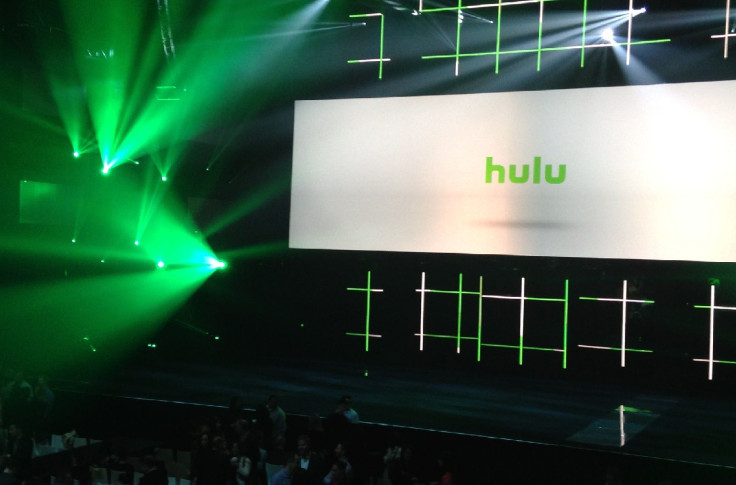Hulu vs. Netflix: Battle Heats Up Streaming Competition And ‘Seinfeld’ Is Only The Beginning

At the Hammerstein Ballroom in midtown Manhattan Wednesday morning, Jerry Seinfeld stood before a groggy but attentive crowd of journalists and advertising executives to trumpet the news that his namesake sitcom -- at long last -- will soon be available to stream online. After a months-long bidding war, the online video company Hulu acquired the exclusive subscription streaming rights to every “Seinfeld” episode.
“I couldn’t be more excited that this show will be seen this way,” Seinfeld said. “I know from having kids it’s the only way they’re going to watch it.”
The Hulu/”Seinfeld” deal, announced as part of Hulu’s “upfront” presentation to advertisers, attracted much attention this week, but in reality it’s only a small piece of the puzzle Hulu needs if it hopes to compete with the likes of Netflix or Amazon.
The more challenging component is original content, which is both expensive and risky. At Wednesday’s upfront presentation, “Saturday Night Live” star Taran Killam, who hosted the event, joked that “Hulu” is a Latin word meaning “second chance for network shows.” All kidding aside, the message was clear: Hulu has built its reputation as an online depot for also-ran entertainment, and even though the company produces a number of original series, it has yet to deliver a breakout hit on the level of Netflix’s “House of Cards” or Amazon’s “Transparent.”
That could change this year. “Every media company has started off with other people’s programming, because it’s cheap and easy to access,” said Rich Greenfield, an analyst with BTIG. “FX used to be ‘Ally McBeal’ and ‘X-Files’ reruns, and now it’s incredible original programming. You really have to look at this like there’s a normal lifecycle for video creators.”
Hulu made it apparent on Wednesday that it is doing what it can to attract A-list Hollywood talent. Company executives touted new series involving J.J. Abrams, James Franco, Amy Poehler, Seth Meyers and Julie Klausner and others. Its most-anticipated project is “11/22/63,” a dramatic series adapted from the best-selling Stephen King novel.
Indie filmmaker Jason Reitman, who is producing Hulu’s upcoming comedy series “Casual,” told the crowd on Wednesday that he had been wanting to join TV’s new golden age. “In the same way that I saw all the great films coming out of Sundance back in the ‘90s and thought, I want to be part of that, I looked at modern television, and I thought, yeah -- put me in, coach,” Reitman said.

Libraries Still Matter
Seinfeld’s quip about his kids never watching “Seinfeld” seems an exaggeration seeing how the classic 1990s sitcom airs numerous times a day on cable. But the rapidly changing ways in which viewers access and consume television is no joke. Sitcoms, with their potential for endless rerun revenue, have long been television’s most profitable scripted genre, and “Seinfeld” itself has been crowned the most profitable show in history. But as audiences become more elusive and cord-cutters migrate to online television services and on-demand viewing, cable executives know the rerun well will eventually run dry.
“Consumers love to stream,” said Greenfield. “They increasingly don’t like the constraints of the traditional TV ecosystem, and they’re looking at the compelling consumer interfaces and content on-demand, whether it’s Hulu, Netflix, Amazon, YouTube and beyond.”
Already, networks that rely heavily on syndicated series are struggling to keep their audiences. TBS, where “Seinfeld” currently lives in reruns, saw its viewership decline by 12 percent last year, according to Nielsen data analyzed by MoffettNathanson.
In other words, the Hulu/”Seinfeld” deal is about much more than close-talkers, soup Nazis and yada-yada-yada. It’s about the growing arms race between the major streaming video providers -- Netflix, Amazon, Hulu -- as they aggressively acquire new content and work to build up their libraries. Analysts say it’s no longer a question of whether viewers will embrace these types of services. It’s a question of which ones they’ll embrace.
“The more of these that exist, the more willing you are to cut the cord or shave your traditional cord,” Greenfield said. “The more options you have on-demand, the easier it is to cut completely out of your Comcast video bundle or Charter video bundle and go over-the-top only, or at least scale that package back.”
Watch Your Back, Netflix
For now, Netflix is the clear market leader in online streaming, but it has company. A March report from Nielsen Media found that Netflix reached 36 percent of all U.S. television households. Amazon Prime Instant Video was a rapidly gaining second, reaching 13 percent of households, while Hulu Plus reached only 6.5 percent. Hulu has about 9 million subscribers, compared to Netflix’s 62 million.
But Wednesday’s “Seinfeld” coup proved Hulu means business in terms of being seen as a serious competitor. The deal was unveiled along with a slew of new announcements at the company’s star-studded “upfront” presentation, where Hulu executives touted a new content agreement with AMC Networks and said its total streams increased 77 percent in the first three months of this year. The company also said it is dropping the word “Plus” from its paid subscription service as a way of not confusing consumers.
Symbolically, the move presents a more consistent message that the Hulu brand is one worth paying for.
Christopher Zara is a senior writer who covers media and culture. News tips? Email me here. Follow me on Twitter @christopherzara.
© Copyright IBTimes 2024. All rights reserved.












